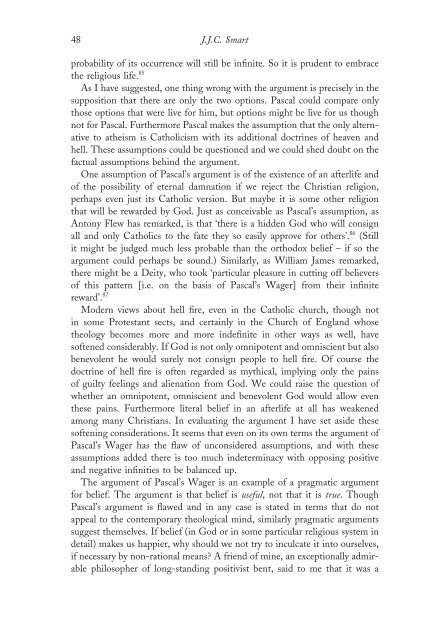Atheism and Theism JJ Haldane - Common Sense Atheism
Atheism and Theism JJ Haldane - Common Sense Atheism
Atheism and Theism JJ Haldane - Common Sense Atheism
Create successful ePaper yourself
Turn your PDF publications into a flip-book with our unique Google optimized e-Paper software.
48 J.J.C. Smart<br />
probability of its occurrence will still be infinite. So it is prudent to embrace<br />
the religious life. 85<br />
As I have suggested, one thing wrong with the argument is precisely in the<br />
supposition that there are only the two options. Pascal could compare only<br />
those options that were live for him, but options might be live for us though<br />
not for Pascal. Furthermore Pascal makes the assumption that the only alternative<br />
to atheism is Catholicism with its additional doctrines of heaven <strong>and</strong><br />
hell. These assumptions could be questioned <strong>and</strong> we could shed doubt on the<br />
factual assumptions behind the argument.<br />
One assumption of Pascal’s argument is of the existence of an afterlife <strong>and</strong><br />
of the possibility of eternal damnation if we reject the Christian religion,<br />
perhaps even just its Catholic version. But maybe it is some other religion<br />
that will be rewarded by God. Just as conceivable as Pascal’s assumption, as<br />
Antony Flew has remarked, is that ‘there is a hidden God who will consign<br />
all <strong>and</strong> only Catholics to the fate they so easily approve for others’. 86 (Still<br />
it might be judged much less probable than the orthodox belief – if so the<br />
argument could perhaps be sound.) Similarly, as William James remarked,<br />
there might be a Deity, who took ‘particular pleasure in cutting off believers<br />
of this pattern [i.e. on the basis of Pascal’s Wager] from their infinite<br />
reward’. 87<br />
Modern views about hell fire, even in the Catholic church, though not<br />
in some Protestant sects, <strong>and</strong> certainly in the Church of Engl<strong>and</strong> whose<br />
theology becomes more <strong>and</strong> more indefinite in other ways as well, have<br />
softened considerably. If God is not only omnipotent <strong>and</strong> omniscient but also<br />
benevolent he would surely not consign people to hell fire. Of course the<br />
doctrine of hell fire is often regarded as mythical, implying only the pains<br />
of guilty feelings <strong>and</strong> alienation from God. We could raise the question of<br />
whether an omnipotent, omniscient <strong>and</strong> benevolent God would allow even<br />
these pains. Furthermore literal belief in an afterlife at all has weakened<br />
among many Christians. In evaluating the argument I have set aside these<br />
softening considerations. It seems that even on its own terms the argument of<br />
Pascal’s Wager has the flaw of unconsidered assumptions, <strong>and</strong> with these<br />
assumptions added there is too much indeterminacy with opposing positive<br />
<strong>and</strong> negative infinities to be balanced up.<br />
The argument of Pascal’s Wager is an example of a pragmatic argument<br />
for belief. The argument is that belief is useful, not that it is true. Though<br />
Pascal’s argument is flawed <strong>and</strong> in any case is stated in terms that do not<br />
appeal to the contemporary theological mind, similarly pragmatic arguments<br />
suggest themselves. If belief (in God or in some particular religious system in<br />
detail) makes us happier, why should we not try to inculcate it into ourselves,<br />
if necessary by non-rational means? A friend of mine, an exceptionally admirable<br />
philosopher of long-st<strong>and</strong>ing positivist bent, said to me that it was a

















